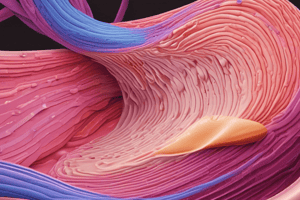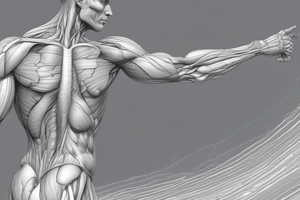Podcast
Questions and Answers
Which hormone, released by the parathyroid glands, prompts osteoclasts to resorb bone matrix when blood calcium levels decrease?
Which hormone, released by the parathyroid glands, prompts osteoclasts to resorb bone matrix when blood calcium levels decrease?
- Growth hormone
- Parathyroid hormone (PTH) (correct)
- Calcitonin
- Thyroxine
The dermis is responsible for housing sensory receptors that respond to pressure and pain.
The dermis is responsible for housing sensory receptors that respond to pressure and pain.
True (A)
What connects muscle to bone?
What connects muscle to bone?
Tendons
The primary function of the __________ is to store calcium and provide structural support to the body.
The primary function of the __________ is to store calcium and provide structural support to the body.
Match the following skin layers with their primary functions:
Match the following skin layers with their primary functions:
Which type of muscle is characterized by myogenic activity?
Which type of muscle is characterized by myogenic activity?
Smooth muscle has a striated appearance.
Smooth muscle has a striated appearance.
What is the role of the sinoatrial node in cardiac muscle?
What is the role of the sinoatrial node in cardiac muscle?
Cardiac muscle cells are interconnected through ______ discs.
Cardiac muscle cells are interconnected through ______ discs.
Match the following muscles with their characteristics:
Match the following muscles with their characteristics:
What distinguishes cardiac muscle from smooth muscle?
What distinguishes cardiac muscle from smooth muscle?
Cardiac muscle contracts sequentially and does not allow for synchronized contraction.
Cardiac muscle contracts sequentially and does not allow for synchronized contraction.
What type of muscle tissue is responsible for peristalsis?
What type of muscle tissue is responsible for peristalsis?
What is the primary function of osteoblasts in ossification?
What is the primary function of osteoblasts in ossification?
Endochondral ossification occurs directly within fibrous membranes.
Endochondral ossification occurs directly within fibrous membranes.
Name one type of ossification mentioned in the content.
Name one type of ossification mentioned in the content.
Tendons connect _____ to bones.
Tendons connect _____ to bones.
Match the following types of bone to their descriptions:
Match the following types of bone to their descriptions:
Which of the following bones is primarily formed through endochondral ossification?
Which of the following bones is primarily formed through endochondral ossification?
The thyroid gland plays a role in calcium balance in the body.
The thyroid gland plays a role in calcium balance in the body.
During ossification, what substance do osteoblasts secrete?
During ossification, what substance do osteoblasts secrete?
_____ serve as vital connections that bridge bones and muscles.
_____ serve as vital connections that bridge bones and muscles.
What occurs during the calcification process in ossification?
What occurs during the calcification process in ossification?
What initiates the power stroke in the actin-myosin crossbridge cycle?
What initiates the power stroke in the actin-myosin crossbridge cycle?
The autonomic nervous system only influences voluntary movements.
The autonomic nervous system only influences voluntary movements.
What are the two responses orchestrated by the autonomic nervous system?
What are the two responses orchestrated by the autonomic nervous system?
Once exposed, the myosin head undergoes a __________.
Once exposed, the myosin head undergoes a __________.
Match each term with its definition:
Match each term with its definition:
During the actin-myosin cycle, what happens right after the power stroke?
During the actin-myosin cycle, what happens right after the power stroke?
Tropomyosin must be removed in order for myosin to bind to actin.
Tropomyosin must be removed in order for myosin to bind to actin.
What resets the myosin head to its high-energy position?
What resets the myosin head to its high-energy position?
The human skeleton is referred to as an __________ because it is located internally.
The human skeleton is referred to as an __________ because it is located internally.
What role does acetylcholine play at the neuromuscular junction?
What role does acetylcholine play at the neuromuscular junction?
What is the primary function of keratinocytes in the epidermis?
What is the primary function of keratinocytes in the epidermis?
The stratum granulosum contains live keratinocytes.
The stratum granulosum contains live keratinocytes.
What type of cells are responsible for generating melanin?
What type of cells are responsible for generating melanin?
The upper 20% of the dermis, characterized by upward projections, is known as the ______ region.
The upper 20% of the dermis, characterized by upward projections, is known as the ______ region.
Match the layers of the epidermis with their key features:
Match the layers of the epidermis with their key features:
Which layer of the epidermis is primarily associated with sensory perception?
Which layer of the epidermis is primarily associated with sensory perception?
The reticular region of the dermis is responsible for temperature regulation.
The reticular region of the dermis is responsible for temperature regulation.
Identify the cell type in the epidermis that assists in immune system activation.
Identify the cell type in the epidermis that assists in immune system activation.
Meissner’s corpuscles, sensitive touch receptors, are located within the ______ of the dermis.
Meissner’s corpuscles, sensitive touch receptors, are located within the ______ of the dermis.
What is the characteristic composition of the dermis?
What is the characteristic composition of the dermis?
Flashcards are hidden until you start studying
Study Notes
Smooth Muscle
- Facilitates material transport through peristalsis.
- Lacks organized sarcomeres, unlike skeletal muscle.
- Displays myogenic activity, contracting without nervous system input.
- Associated with the concept of a "second brain" in the gut.
- Non-striated with a single nucleus in each cell.
Cardiac Muscle
- Unique to the heart, exhibiting both skeletal and smooth muscle characteristics.
- Striated and composed of sarcomeres, functioning involuntarily.
- Each cell contains a single nucleus.
- Interconnected by intercalated discs, allowing rapid ion flow and swift action potential propagation.
- Matrix of connected cells enables synchronized contractions without sequential neural signals.
- Myogenic activity regulates heart rhythm independently of the brain.
- Electrical signals originate from the sinoatrial (SA) node, spreading across the heart via the atrioventricular (AV) node and Purkinje fibers.
Muscle Function and Nervous System
- Governs voluntary movements through the somatic nervous system.
- Controls involuntary movements (e.g., shivering) via the autonomic nervous system.
- Autonomic system regulates sympathetic (e.g., dilating blood vessels) and parasympathetic responses.
Connective Elements in Muscles
- Bones and their connections provide essential support for muscle function.
- The human skeleton is an endoskeleton, contrasting with exoskeletons in other organisms.
Bone Formation and Ossification
- Intramembranous ossification: Direct formation within fibrous membranes, primarily developing flat bones (e.g., skull bones).
- Osteoblasts secrete osteoid, which mineralizes to hold osteocytes.
- Endochondral ossification: Indirectly forms long bones via a cartilage model, undergoing calcification to serve as a foundation for bone tissue formation.
Tendons, Ligaments, and Cartilage
- Tendons connect muscles to bones and transmit force for movement.
- Ligaments connect bones to bones, providing joint stability.
Skin Structure
- Epidermis:
- Composed of five strata housing various cell types:
- Keratinocytes: Produce keratin for protection.
- Melanocytes: Generate melanin for UV defense.
- Langerhans cells: Act as immune system activators.
- Composed of five strata housing various cell types:
- Dermis:
- Dense connective tissue with collagen and elastic fibers.
- Divided into the papillary region (nutrient supply, temperature regulation) and the reticular region (structural support).
- Houses sensory receptors, e.g., Meissner’s corpuscles for touch sensitivity.
Answer Key Highlights
- Parathyroid hormone (PTH) stimulates osteoclasts to resorb bone matrix when calcium levels are low.
- Tendons connect muscle to bone, facilitating movement.
- The dermis contains sensory receptors for light touch and skin stretching.
- ATP hydrolysis enables myosin detachment from actin in muscle contraction.
- Evaporative cooling helps in body temperature regulation during heat exposure.
Studying That Suits You
Use AI to generate personalized quizzes and flashcards to suit your learning preferences.




